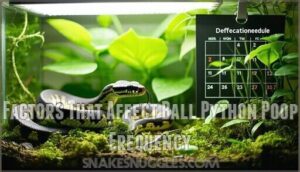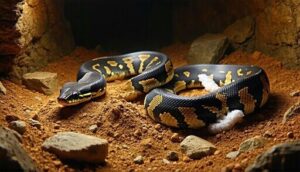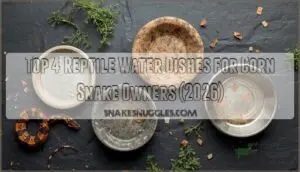This site is supported by our readers. We may earn a commission, at no cost to you, if you purchase through links.

Their digestive systems extract 91% of nutrients from prey, leaving remarkably little waste behind. A healthy ball python usually defecates every 5 to 14 days, though this window stretches wider depending on meal size, enclosure temperature, and individual metabolism.
Understanding what’s normal for your python—and recognizing when delayed defecation signals trouble—prevents unnecessary worry and catches genuine health issues before they escalate.
Table Of Contents
- Key Takeaways
- How Often Do Ball Pythons Poop
- Factors That Affect Ball Python Poop Frequency
- What Normal Ball Python Poop Looks Like
- Signs Your Ball Python is Constipated
- How Ball Python Digestion Works
- Abnormal Poop and Health Warning Signs
- How to Help a Constipated Ball Python
- Environmental Factors for Healthy Digestion
- Maintaining Regular Ball Python Bowel Movements
- Frequently Asked Questions (FAQs)
- How often do ball pythons poop?
- How long does a ball python poop after eating a meal?
- Do ball pythons poop?
- How long does it take a Python to poop?
- When does a ball python’s poop swell?
- How often should a ball python eat?
- How long can a snake go without pooping?
- How do I know if my ball python is constipated?
- How often does a ball python go to the bathroom?
- Can I feed my ball python if they haven’t pooped?
- Conclusion
Key Takeaways
- Ball pythons defecate every one to six weeks on average, with most healthy adults eliminating waste 6-8 days after feeding—this infrequent schedule reflects their remarkable 91% nutrient absorption efficiency, which leaves minimal waste behind.
- Constipation becomes a concern only after three weeks without defecation post-feeding, especially when accompanied by behavioral changes (lethargy, refusal to eat), abdominal swelling, or visible straining—these signs warrant immediate veterinary evaluation.
- Optimal enclosure conditions (88-92°F basking zone, 50-60% humidity) directly control digestive speed and bowel regularity, since temperature activates digestive enzymes while proper hydration prevents stool from becoming impacted or difficult to pass.
- Normal feces appear dark brown to black with firm consistency alongside white-to-cream chalky urates, while warning signs include watery stool, unusual colors (green, yellow, or black/tarry), blood presence, or visible parasites—all indicating digestive dysfunction requiring intervention.
How Often Do Ball Pythons Poop
Understanding when your ball python should defecate isn’t always straightforward, and there’s more variation than you might expect.
The frequency depends on several factors, from individual metabolism to feeding schedules.
Let’s look at what’s typical, what’s normal after a meal, and how much variation exists between snakes.
Average Defecation Frequency in Healthy Ball Pythons
Healthy adult ball pythons usually defecate once every one to six weeks, though you’ll notice considerable individual variation in this digestive rhythm. Your snake’s defecation patterns depend on several physiological factors that directly influence bowel movement frequency:
- Digestive efficiency: Ball pythons absorb 91% of nutrients, leaving minimal waste
- Metabolic rate: Age and body condition affect how quickly digestion occurs
- Feeding schedule: Less frequent meals naturally extend the defecation cycle
- Individual variation: Some healthy pythons wait up to two months between bowel movements
Consistency matters more than hitting a specific timeline when monitoring your snake’s digestive health and uric acid elimination patterns. Understanding digestion basics is essential for recognizing healthy and unhealthy patterns in your ball python’s bowel movements.
Normal Time Between Feeding and Defecation
After your snake finishes a meal, you can usually expect defecation within six to eight days if enclosure conditions hit that ideal range of 88-92°F with proper humidity. The digestion cycle slows considerably outside this temperature range, disrupting normal defecation patterns and nutrient absorption.
You’ll find that feeding intervals directly influence poop schedules—your ball python’s digestive system shifts into high gear immediately after eating, then gradually returns to its resting state once the meal’s processed.
Individual Variation in Bowel Movement Patterns
While those timelines give you a baseline, don’t expect your individual snake to behave like a textbook example—some ball pythons defecate consistently every seven days, while others stretch intervals to six weeks or longer, even with identical care and feeding schedules.
Genetic factors, age variation, and snake size all influence digestion rates, while your ball python’s feeding habits and overall health trends determine how efficiently uric acid and waste products move through the system.
Consistency within your specific snake’s pattern matters more than matching some universal standard—track your individual’s defecation cycle to establish what’s normal for them.
Factors That Affect Ball Python Poop Frequency
Your ball python’s defecation schedule isn’t set in stone—it’s shaped by multiple husbandry and biological variables. Understanding these factors helps you distinguish between normal variation and potential health concerns.
Let’s examine the key elements that influence how often your snake produces waste.
Diet and Prey Size Impact
What you feed your Ball Python directly impacts how often it’ll need to poop. Here’s how diet and prey size shape digestion and defecation timing:
- Prey Mass Effects: Larger meals take longer to digest, extending the time between bowel movements and reducing overall frequency.
- Feeding Intervals: Snakes fed weekly defecate more frequently than those on biweekly schedules—your feeding routine dictates metabolic outcomes.
- Digestion Rates: With 91% nutrient absorption efficiency, Ball Python digestion produces minimal waste, meaning less frequent elimination of feces and uric acid.
- Python Diet Composition: Appropriately-sized prey (10-15% body weight) optimizes snake nutrition without straining digestive capacity or causing impaction.
Understanding the whole prey items is essential for maintaining a healthy digestive system in Ball Pythons.
Temperature and Humidity Requirements
Your enclosure’s temperature and humidity aren’t just comfort settings—they’re the thermostat and moisture control that determine whether your Ball Python’s digestive system runs smoothly or stalls out completely. Without proper Thermal Gradient (88-92°F basking spot) and Humidity Control (50-60%), digestive enzymes won’t activate efficiently.
Temperature Fluctuation disrupts metabolic processing, delaying defecation. Consistent Enclosure Climate through quality Heating Options ensures ideal Ball Python Care—your reptile care foundation for regular bowel function.
Age and Metabolism Differences
A juvenile Ball Python processes meals nearly twice as fast as an adult, which means your snake’s age directly shapes how often you’ll be cleaning up after it. Young snakes have elevated Metabolic Rates to support Growth Patterns and higher Energy Needs during critical Development Stages.
As Ball Pythons mature, Digestion slows, Uric Acid production decreases proportionally, and defecation intervals extend—sometimes stretching from weekly to monthly. Age Factors fundamentally alter Snake Health expectations for normal Poop frequency.
Feeding Schedule and Frequency
How frequently you offer meals determines not just your snake’s growth, but also the rhythm of its bowel movements—a pattern that becomes as predictable as clockwork once you establish consistency. Feeding Cycles directly influence Digestion Rate and defecation timing.
Here’s how Meal Frequency shapes Snake Health:
- Weekly feeding produces weekly defecation in juveniles
- Biweekly schedules extend intervals to 10-14 days
- Monthly feeding may result in 3-6 week gaps
- Prey Rotation affects Nutrient Uptake efficiency
- Irregular Feeding disrupts predictable Digestion patterns
Your Ball Python’s digestive system synchronizes with the schedule you create.
What Normal Ball Python Poop Looks Like
Recognizing what healthy ball python waste looks like is your baseline for spotting potential problems early.
Normal droppings have distinct components with predictable characteristics tied directly to your snake’s digestive efficiency.
Understanding these visual markers helps you distinguish routine elimination from signs that warrant veterinary attention.
Feces and Urates Composition
When your ball python defecates, you’ll notice it’s actually a two-part package—solid feces and a white, chalky substance called urates that acts as the reptilian version of urine. Unlike mammals, ball pythons excrete nitrogenous waste as uric acid crystals rather than liquid urine—an evolutionary adaptation that conserves water.
The fecal portion contains undigested prey material, while the urates represent the end product of protein metabolism, making fecal analysis valuable for evaluating your python’s hydration status and overall digestion efficiency.
Healthy Color and Texture Characteristics
Healthy ball python feces should appear dark brown to black with a firm, log-like consistency—not unlike a small tootsie roll—while the accompanying urates range from bright white to cream-colored with a semi-solid, paste-like texture. Fresh fecal material should hold its shape without being rock-hard or crumbly, and the uric acid crystals within urates shouldn’t appear watery or excessively dry.
You’ll notice a mild musky poop odor—not putrid or foul-smelling—which indicates normal digestion and proper snake health.
Normal Size Relative to Prey
The fecal mass you find in the enclosure usually measures one-third to one-half the volume of the prey item your ball python consumed, though this proportion reflects the impressive 91% nutrient absorption efficiency of their digestive tract.
Expect proportional scaling based on Prey Size Guidelines:
- Juvenile pythons fed fuzzy mice produce smaller, pencil-eraser-sized feces
- Adult pythons consuming large rats defecate masses resembling human thumb-sized deposits
- Meal Frequency directly influences python poop volume—weekly feeders produce larger, more frequent bowel movements
- Abnormally small feces despite adequate Feeding Ratios may signal Digestive Health concerns requiring veterinary assessment
Signs Your Ball Python is Constipated
Recognizing constipation early can prevent serious health complications in your ball python. The timeline between feeding and defecation acts as your first indicator, but behavioral shifts and physical changes offer equally important clues.
Let’s examine the specific warning signs that suggest your snake needs intervention.
When to Worry About No Defecation
If your ball python hasn’t produced a bowel movement for more than two weeks after its last meal, it’s time to start paying closer attention—though true constipation doesn’t usually become urgent until the three-week mark.
Beyond three weeks without defecation, health risks escalate. Uric acid buildup and digestive stasis can compromise snake health.
If you’re approaching or past this window, veterinary care becomes essential to rule out impaction or underlying digestive dysfunction.
Behavioral Changes Indicating Digestive Issues
Your ball python’s behavior can tell you just as much about digestive trouble as the calendar—watch for restlessness, repeated soaking attempts, or a sudden refusal to eat, all of which may signal that something isn’t moving through as it should. You might also notice excessive rubbing against tank walls or unusual lethargy—both signs of digestive stress that shouldn’t be ignored.
Trust your gut instinct: consistent health monitoring of snake behavior and feeding cues helps you catch digestive issues before they compromise snake health or lead to uric acid buildup.
Physical Signs of Impaction
Beyond behavioral clues, abdominal swelling often reveals what’s happening internally—you might feel a hard, palpable lump near the cloaca, signaling fecal blockage. This intestinal obstruction can cause visible bulging along your snake’s lower body, and radiographs usually show dense, opaque masses where digestive issues have stopped normal peristalsis.
If weeks pass without poop despite feeding, and you detect firmness or distension during gentle palpation, these impaction symptoms demand urgent veterinary evaluation before uric acid buildup or tissue damage complicates recovery.
How Ball Python Digestion Works
Understanding how your ball python processes food explains why defecation patterns vary so much between individuals. These snakes are incredibly efficient digesters, extracting nearly all available nutrients before producing waste.
Let’s break down how their unique digestive system operates and what this means for bowel movement timing.
Digestive System Efficiency and Nutrient Absorption
Remarkably, your ball python absorbs 91% of everything it consumes—a demonstration of evolutionary excellence in Nutrient Uptake and Absorption Efficiency. This impressive digestive prowess minimizes waste while maximizing Energy Conservation, making these reptiles masters of metabolic efficiency.
Key aspects of python poop and snake digestion:
- Digestive Enzymes activate immediately post-feeding, breaking down prey tissue rapidly
- Metabolic Rate adjusts to feeding status, optimizing Reptile Digestion and Defecation cycles
- Only 9% becomes waste—impressive Absorption Efficiency compared to most vertebrates
- Proteins, fats, and calcium are nearly completely extracted during digestion
- This efficiency explains infrequent defecation and aids Snake Health and Nutrition needs
Understanding this system helps you recognize normal versus concerning bowel patterns in your ball python.
Metabolic Slowdown Between Meals
Between meals, your ball python’s digestive system basically hits the pause button—a strategic shutdown that can reduce metabolic activity by up to 50%. This Digestive Rest state is Energy Conservation at its finest. Enzymatic production ceases, gut tissue atrophies temporarily, and your snake’s Metabolic Rate plummets.
This dormancy explains why Ball Python Digestion differs dramatically from mammals—Nutrient Storage sustains them between infrequent meals, making their poop schedule unpredictable but perfectly normal for Reptile Digestion and Defecation patterns.
Typical Digestion Timeline After Feeding
Once your ball python swallows its meal, you’re looking at a 6-8 day digestion window under ideal conditions—though this timeline stretches or shrinks depending on your enclosure’s temperature gradient and your snake’s individual metabolism.
Here’s the typical Food Breakdown progression for Ball Python digestion:
- Days 1-2: Enzymatic activity peaks as gastric acids initiate Nutrient Uptake
- Days 3-5: Intestinal absorption maximizes Gut Health and energy extraction
- Days 6-7: Waste consolidation readies for poop expulsion
- Day 7-8: Defecation usually occurs, completing Feeding Cycles
Digestion Speed directly correlates with thermal management—cooler temps slow reptile metabolism considerably.
Abnormal Poop and Health Warning Signs
Not every bowel movement will look textbook-perfect, and recognizing the warning signs can mean the difference between a minor issue and a serious health problem.
Changes in stool consistency, color, or composition often signal underlying conditions that need your attention. Let’s break down the red flags you shouldn’t ignore.
Runny or Watery Stool Causes
Loose, watery droppings aren’t just messy—they’re often your ball python’s way of signaling that something’s off with its digestive health or environment. Bacterial infections, dietary issues, and parasite infestations can all disrupt normal digestion, while environmental stress from incorrect temperatures or poor hygiene compounds the problem. Dehydration causes further complications, weakening your snake’s ability to process waste properly.
| Cause | What It Means for Your Snake’s Health |
|---|---|
| Bacterial infections | Internal inflammation compromising nutrient absorption |
| Dietary issues | Prey too large or spoiled, overwhelming digestive capacity |
| Environmental stress | Temperature/humidity imbalances slowing metabolic function |
| Parasite infestations | Intestinal damage stealing nutrients and causing irritation |
Parasites and Worm Identification
Spotting parasites early protects your snake from serious intestinal damage and nutrient depletion. Captive ball pythons host several endoparasite species, with nearly half of surveyed snakes testing positive for at least one type through fecal analysis.
The following parasites are commonly found in captive ball pythons:
- Strongylid nematodes appear as oval, thin-shelled eggs on flotation tests, found in roughly 20% of examined pythons
- Ascarid roundworms produce thick-shelled, environmentally resistant eggs detectable in 7% of cases
- Capillaria species show distinctive barrel-shaped eggs with bipolar plugs under microscopic fecal examination
- Pentastomida (tongue worms) infest lung surfaces and appear in stool samples of about 11% of infected snakes
- Entamoeba invadens causes deadly amoebiasis requiring immediate veterinary intervention for python poop abnormalities
Combined wet smears and flotation methods identify parasite stages in over half of reptile fecal samples, making routine parasite detection essential for reptile health.
Wild-caught snakes carry higher parasite loads than captive-bred individuals, though direct life cycle parasites persist in captivity without proper parasite control and prevention protocols, affecting overall animal health.
Unusual Colors or Blood in Stool
Stool color changes tell a story about your snake’s internal health, with shades outside the normal brown-to-dark spectrum signaling everything from minor dietary shifts to urgent bleeding disorders.
Black, tarry feces suggest upper gastrointestinal bleeding requiring immediate veterinary attention, while red streaks or fresh blood inclusion indicates lower digestive tract injury.
Green or yellow stool consistency changes point to bile irregularities or liver dysfunction affecting your ball python’s reptile care needs and overall animal health.
How to Help a Constipated Ball Python
When your ball python hasn’t defecated in over two weeks, a few simple interventions can help restore normal bowel function. Most cases of mild constipation respond well to adjustments in husbandry or gentle physical assistance at home.
Here’s what you can do to safely encourage defecation and when it’s time to seek professional help.
Warm Water Soaking Method
When a ball python refuses to defecate despite your best husbandry efforts, a controlled warm water soak can help loosen compacted stool and stimulate natural bowel activity.
Fill a container with 85-88°F water reaching just above your snake’s widest point, allowing your ball python to relax for 20-30 minutes under supervision.
This soak duration usually encourages poop elimination while maintaining proper humidity control without causing stress or thermal shock.
Adjusting Enclosure Temperature and Humidity
If soaking alone doesn’t resolve the issue, the next step is fine-tuning your enclosure’s thermal gradient and moisture levels—two factors that directly influence digestive motility in ball pythons.
Verify your basking zone reaches 88-92°F and your humidity sits at 50-60%—suboptimal temperature slows peristalsis, while low humidity dehydrates stool. Use reliable climate monitoring devices and adjust heat sources or ventilation systems accordingly to restore normal reptile bowel function.
When Veterinary Intervention is Needed
Sometimes environmental adjustments won’t be enough. Contact a reptile veterinarian if constipation persists beyond these intervention thresholds:
- No defecation for 3+ weeks after feeding—impaction risk escalates sharply
- Hardened or swollen abdomen, especially near the tail—physical blockage indicator
- Loss of appetite combined with weeks without bowel movements—signals serious digestive issues
- Lethargy, straining, or visible discomfort—emergency signs requiring medical diagnosis and potential impaction treatment
Environmental Factors for Healthy Digestion
Your ball python’s digestive health hinges on creating the right environment—temperature, humidity, and cleanliness all play vital roles in keeping things moving smoothly. When these factors fall out of balance, even a well-fed snake can struggle with irregular bowel movements.
Let’s look at the three environmental essentials you need to fine-tune for peak digestion.
Optimal Temperature Gradient Setup
Your ball python’s digestive system operates like a finely tuned engine—it only fires on all cylinders when the temperature is right. You’ll need to establish a proper thermal gradient with a basking zone between 88-92°F and a cooler retreat around 78-80°F.
Use quality heat sources like under-tank heaters or ceramic emitters, and monitor climate zones with multiple thermometers. This gradient design allows your snake to thermoregulate, moving between zones to improve digestion and maintain reptile health.
Proper Humidity Levels for Bowel Function
Humidity isn’t just about keeping your ball python’s skin supple—it directly influences how smoothly waste moves through the intestinal tract and exits the body. Maintain 50-60% humidity to support proper bowel movement and snake hydration.
Low humidity dehydrates stool, creating digestive balance issues and potential impaction. Use hygrometers for accurate enclosure maintenance, and mist sparingly to fine-tune bowel health without compromising your python’s respiratory function.
Substrate and Enclosure Cleanliness
The substrate you choose doesn’t just cushion your snake—it can harbor bacteria that compromise gut health if waste isn’t removed promptly. Spot-clean python poop immediately and replace soiled substrate options weekly to maintain proper sanitation.
Essential enclosure maintenance protocols:
- Remove snake feces within 24 hours to prevent bacterial overgrowth
- Deep-clean the habitat monthly with reptile-safe disinfectant
- Monitor humidity control during cleaning schedules to preserve digestive function
Maintaining Regular Ball Python Bowel Movements
Keeping your ball python’s digestive system running smoothly isn’t about luck—it’s about consistency in a few key areas. The right feeding practices, environmental conditions, and monitoring habits work together to prevent most bowel movement problems before they start.
Here’s what you need to focus on to maintain regular, healthy defecation.
Appropriate Prey Size Selection
Choosing prey that’s about 10-15% of your ball python’s body weight—roughly the same width as the thickest part of their body—prevents digestive strain that can slow down or stall bowel movements entirely. Oversized meals tax the digestive system, while undersized prey may not stimulate regular bowel function.
Use these Prey Size Guidelines to improve snake nutrition:
| Python Size | Appropriate Prey Item | Feeding Ratios |
|---|---|---|
| Hatchling (50-100g) | Hopper mice | 10-15% body weight |
| Juvenile (200-500g) | Adult mice | Match body width |
| Subadult (500-1000g) | Small rats | 10-15% body weight |
| Adult (1500g+) | Medium-large rats | Match body width |
Proper prey selection respects reptile biology and aids consistent digestion in your python.
Consistent Feeding Schedule
Feeding your ball python on a predictable routine—say, every 7-10 days for adults or 5-7 days for juveniles—trains their digestive system to work like clockwork and helps you spot irregularities before they become problems.
Consistent feeding cycles align with snake biology, promoting steady growth rates and predictable python poop schedules.
When meal planning becomes routine, you’ll notice patterns in your pet’s feeding response and bowel movements, making ball python care simpler and health monitoring more effective.
Hydration and Fresh Water Access
Water isn’t just a nice-to-have in your ball python’s enclosure—it’s the lubricant that keeps their entire digestive tract moving smoothly from meal to defecation. Fresh water should be available 24/7 in a clean bowl large enough for soaking. Dehydration signs like wrinkled skin or sunken eyes signal compromised bowel function.
Maintain proper humidity control between 50-60% to support hydration—your pet absorbs moisture through their skin, making environmental humidity as critical as direct water access for ideal animal health and consistent defecation patterns.
Monitoring and Tracking Defecation Patterns
Keeping a simple log of when your ball python eats and eliminates transforms abstract worry into concrete data—giving you the baseline you need to spot real problems before they escalate. Note each feeding date, prey size, and when your snake defecates.
These defecation records reveal your python’s individual poop schedules, showing whether bowel movement patterns shift gradually or suddenly—an early warning system for digestive health issues. Tracking defecation trends helps you distinguish normal variation from genuine concerns requiring veterinary attention.
Frequently Asked Questions (FAQs)
How often do ball pythons poop?
Like clockwork in slow motion, your ball python’s bowel movements follow a predictable rhythm. Healthy ball pythons generally defecate once every one to six weeks, with most pooping about seven days after eating.
Individual snake digestion and feeding schedules directly influence this poop frequency pattern.
How long does a ball python poop after eating a meal?
Most ball pythons defecate within 6-8 days after eating. This bowel movement timing reflects their efficient digestion speed, though individual snakes may show variation.
Some healthy pythons poop consistently around the one-week mark post-feeding.
Do ball pythons poop?
Yes, ball pythons definitely poop—it’s a normal part of snake digestion and reptile health. Because their metabolism is remarkably efficient at extracting nutrients, they produce waste far less frequently than mammals, making proper monitoring essential for reptile care.
How long does it take a Python to poop?
Generally, ball pythons defecate six to eight days after consuming a meal, assuming ideal temperature and humidity conditions support proper digestion.
This defecation process completes the poop cycle, producing snake feces composed of both solid waste and urates.
When does a ball python’s poop swell?
Ball python stool doesn’t truly "swell"—but dehydration creates the illusion. When reptiles lack adequate hydration, their intestinal tract reabsorbs excessive water from formed feces, causing stool to become compacted, dry, and harder to pass, potentially leading to bowel obstructions requiring veterinary intervention.
How often should a ball python eat?
Juveniles require feeding once every five to seven days to support rapid growth rates and meet heightened dietary needs, while adults thrive on meal scheduling every ten to fourteen days, reflecting their slower metabolism and reduced nutritional requirements for ideal ball python care and feeding.
How long can a snake go without pooping?
Healthy ball pythons can comfortably go six to eight weeks between bowel movements without concern. Snake Poop Duration varies by individual metabolism, feeding schedule, and environmental conditions.
Beyond two months, investigate potential Constipation Risks affecting Digestive Health and overall Snake Gut Health.
How do I know if my ball python is constipated?
Oddly enough, you might notice the problem before your ball python does. Constipation signs include no defecation for three weeks post-feeding, straining without producing stool, decreased appetite, lethargy, and a visibly distended abdomen—veterinary care becomes essential at this point.
How often does a ball python go to the bathroom?
Most adult ball pythons defecate once every one to six weeks, with bathroom habits reflecting their feeding schedule and individual metabolism.
Digestive issues, environmental factors, and snake health all influence bowel movement patterns in these efficient reptiles.
Can I feed my ball python if they haven’t pooped?
If your ball python hasn’t pooped yet, hold off on feeding. Think of it like stacking dishes in a sink—you need space before adding more.
Wait until defecation occurs to prevent digestive health issues and guarantee proper nutrient absorption during your feeding schedule.
Conclusion
Your python’s digestive timeline isn’t broken—it’s evolved for maximum efficiency. While mammals waste energy processing food daily, ball pythons extract nearly every nutrient from prey, defecating only when necessary.
Understanding how often ball pythons poop means recognizing that your snake’s "schedule" reflects perfect metabolic adaptation, not dysfunction. Track patterns instead of panicking over dates.
When something genuinely shifts—prolonged refusal to defecate paired with lethargy or distress—you’ll catch it early. Until then, trust the biology: slow digestion isn’t a malfunction. It’s mastery.
- https://www.thecritterdepot.com/blogs/news/ball-python-care-guide
- https://community.morphmarket.com/t/ball-python-concerns-young-new-owner-looking-for-advice/43707
- https://a-z-animals.com/blog/python-poop-everything-youve-ever-wanted-to-know/
- https://journals.biologists.com/jeb/article/218/13/2089/13810/Digesting-pythons-quickly-oxidize-the-proteins-in
- https://ball-pythons.net/forums/showthread.php?240685-How-often-do-your-ball-pythons-poop-pee
















